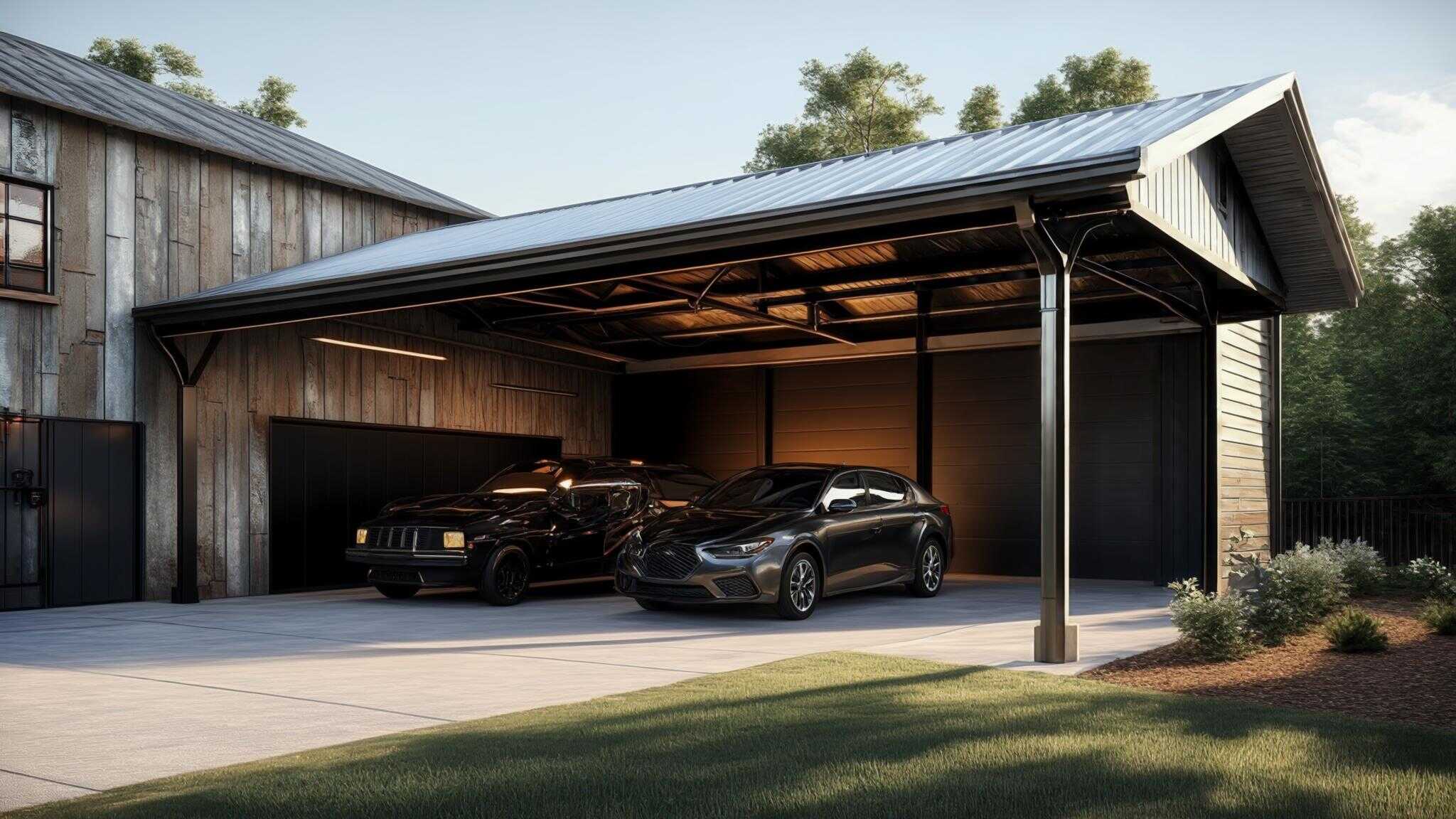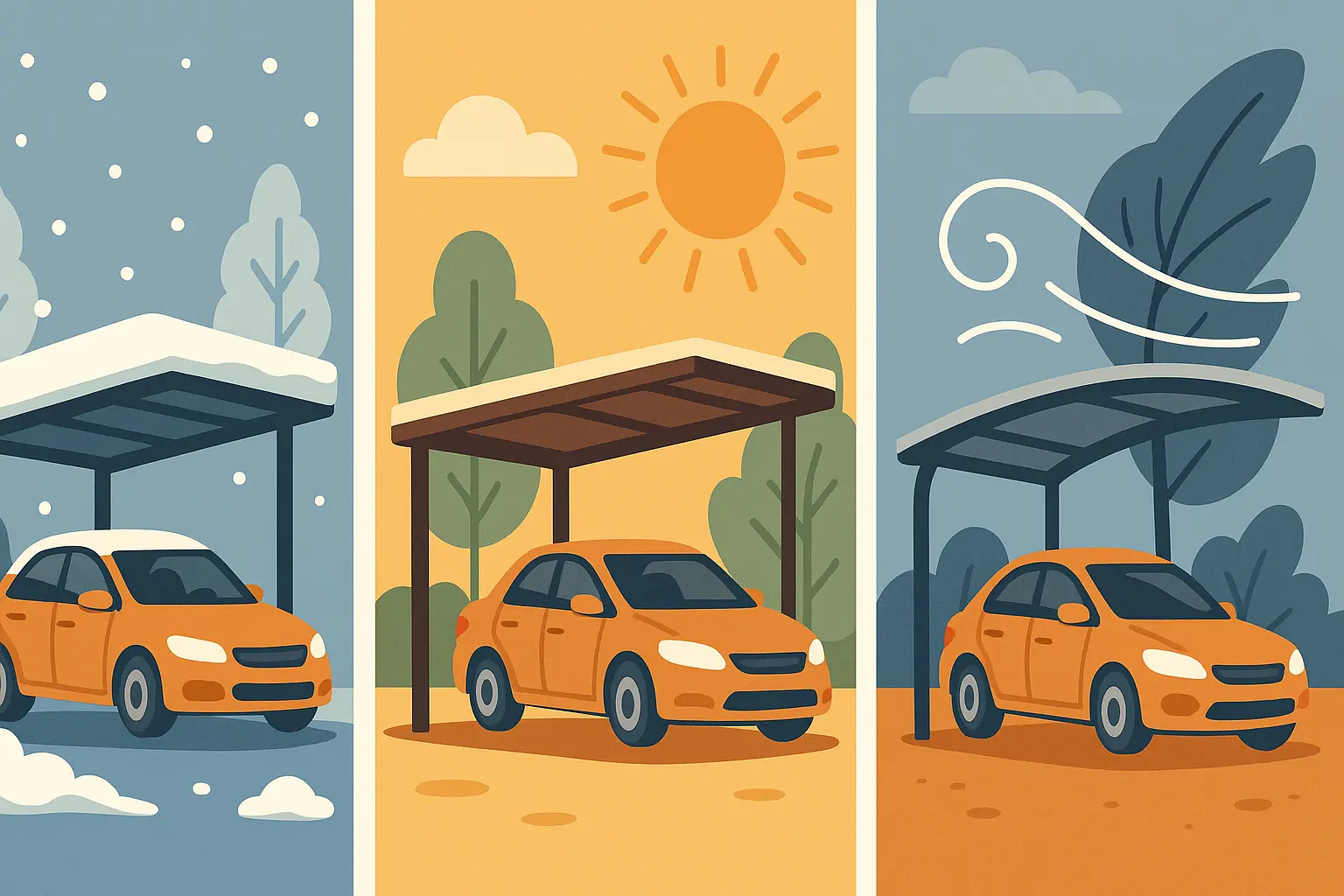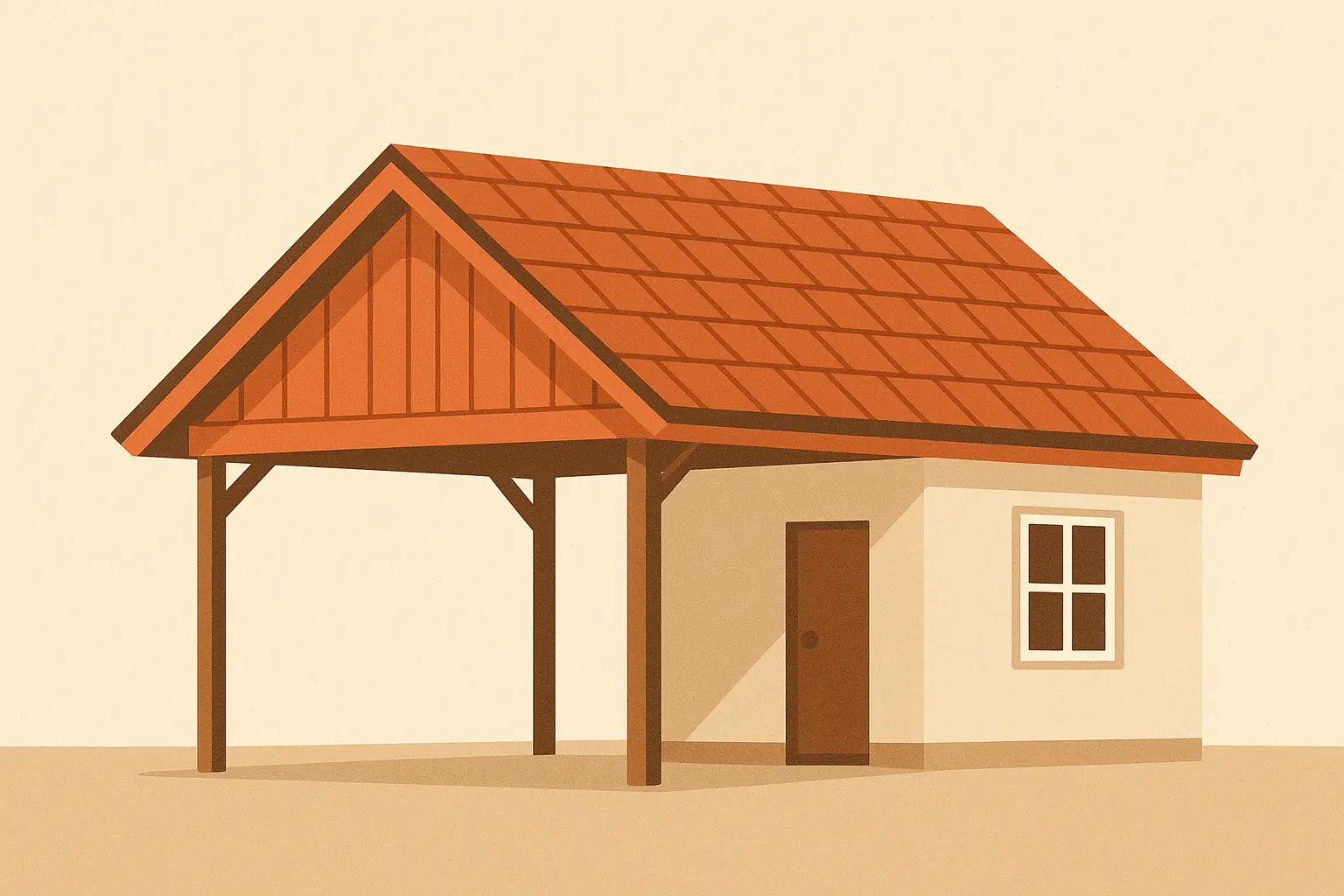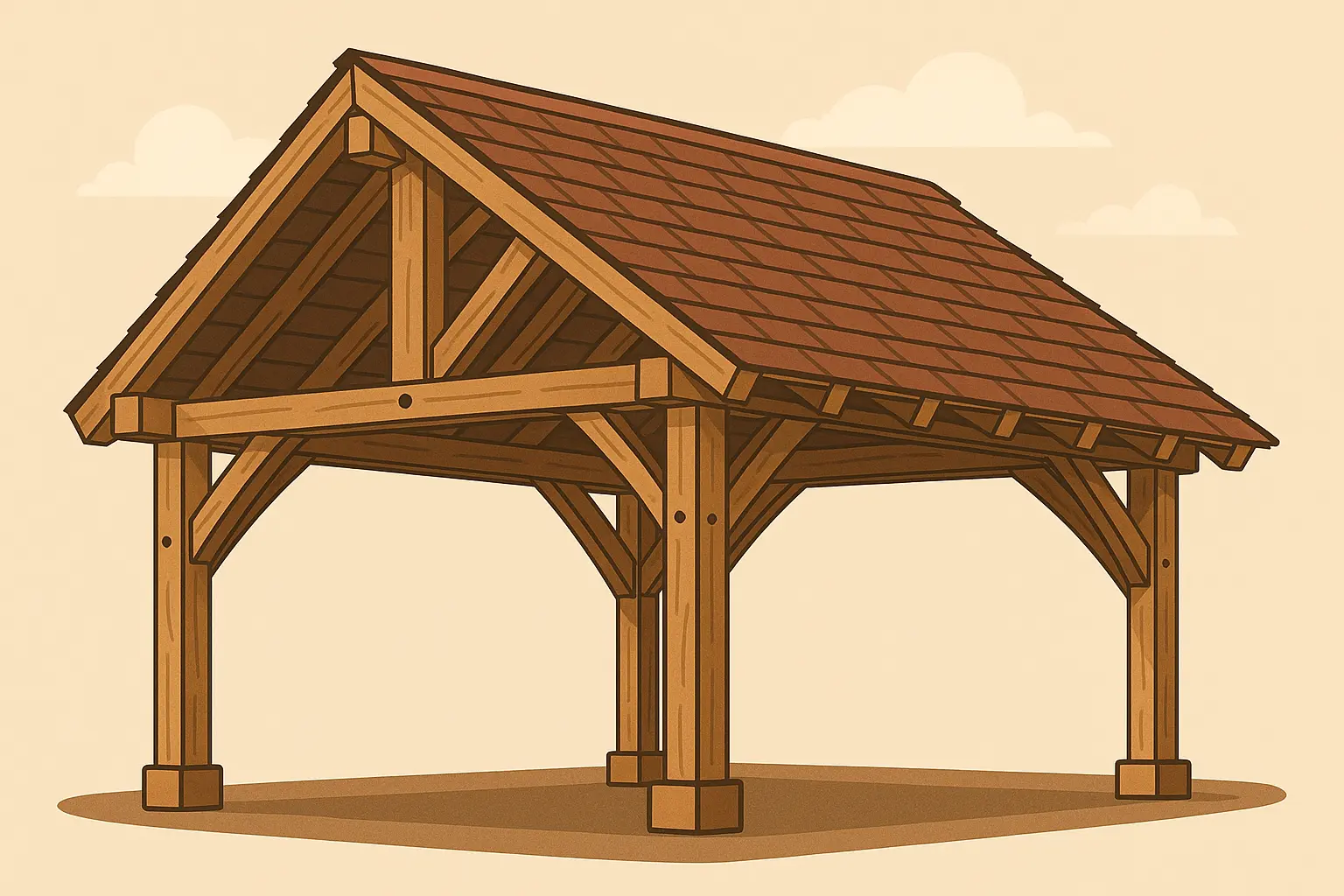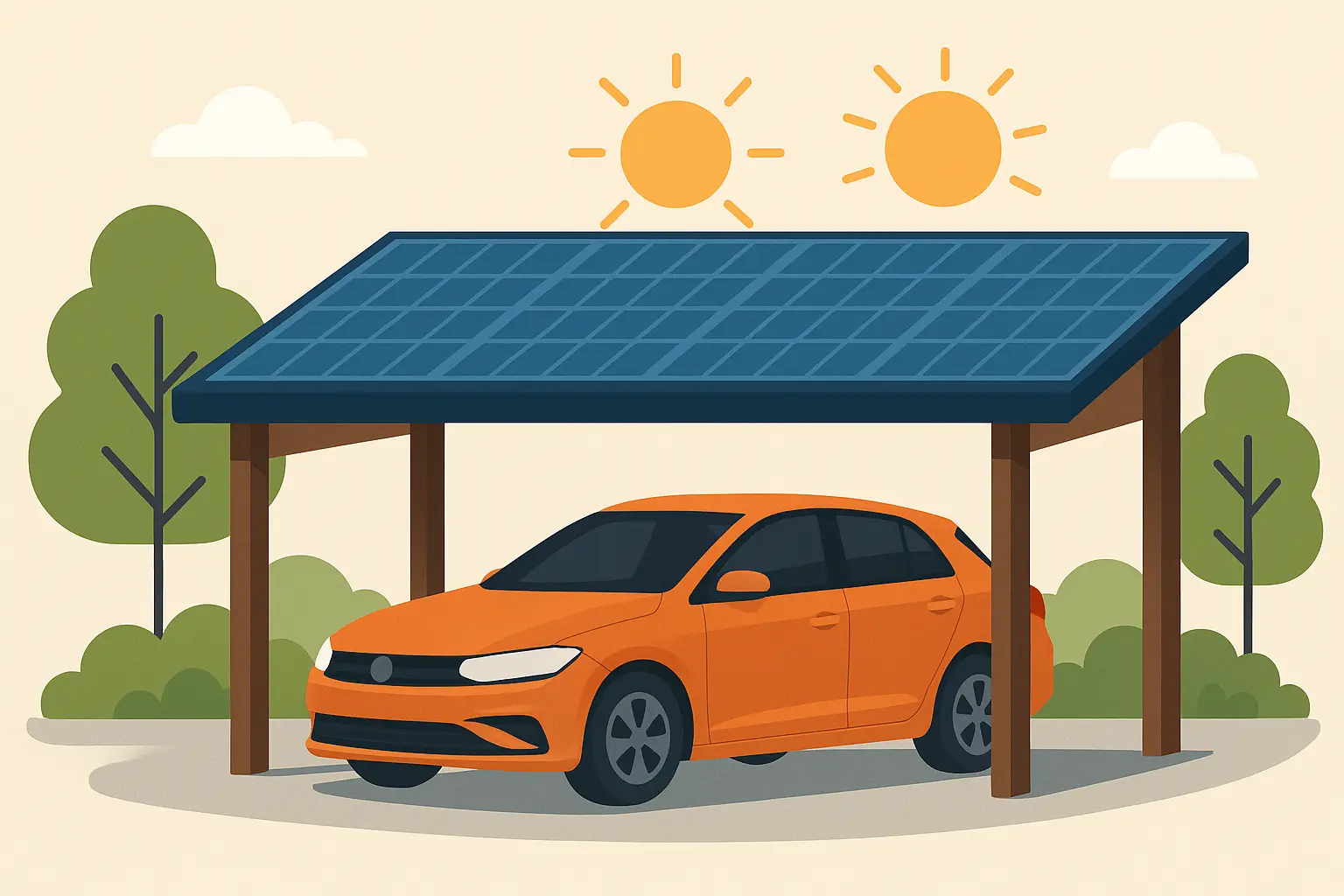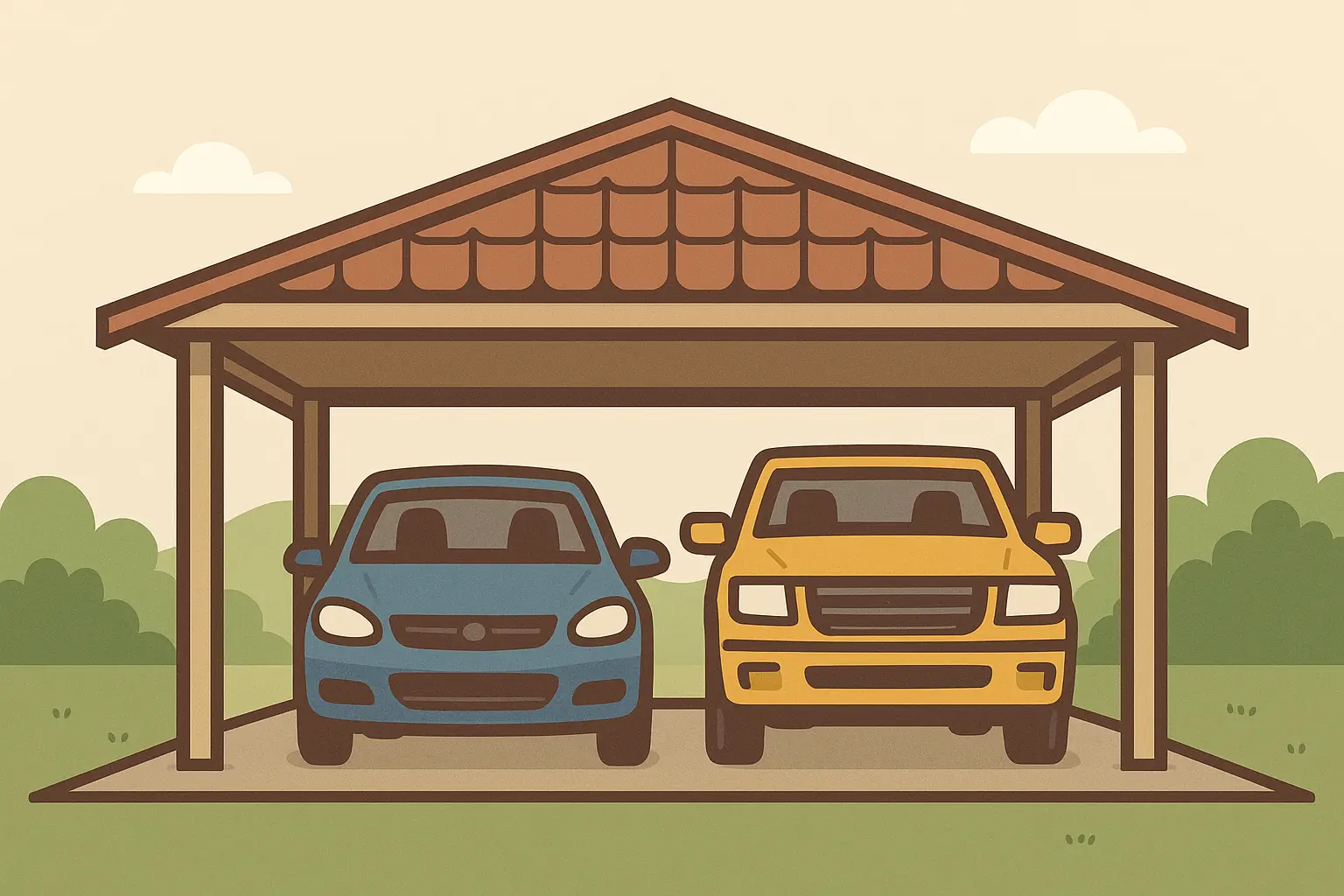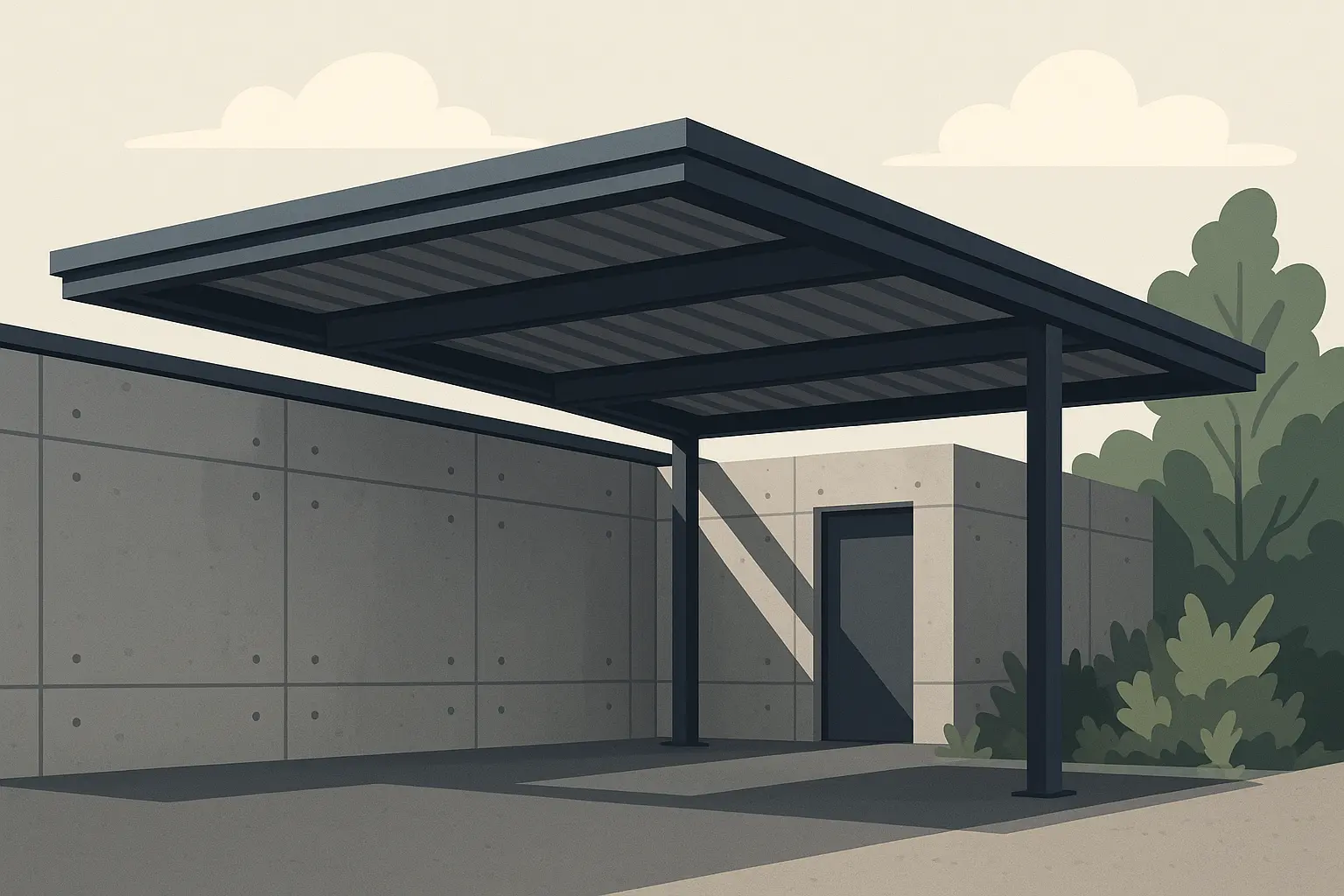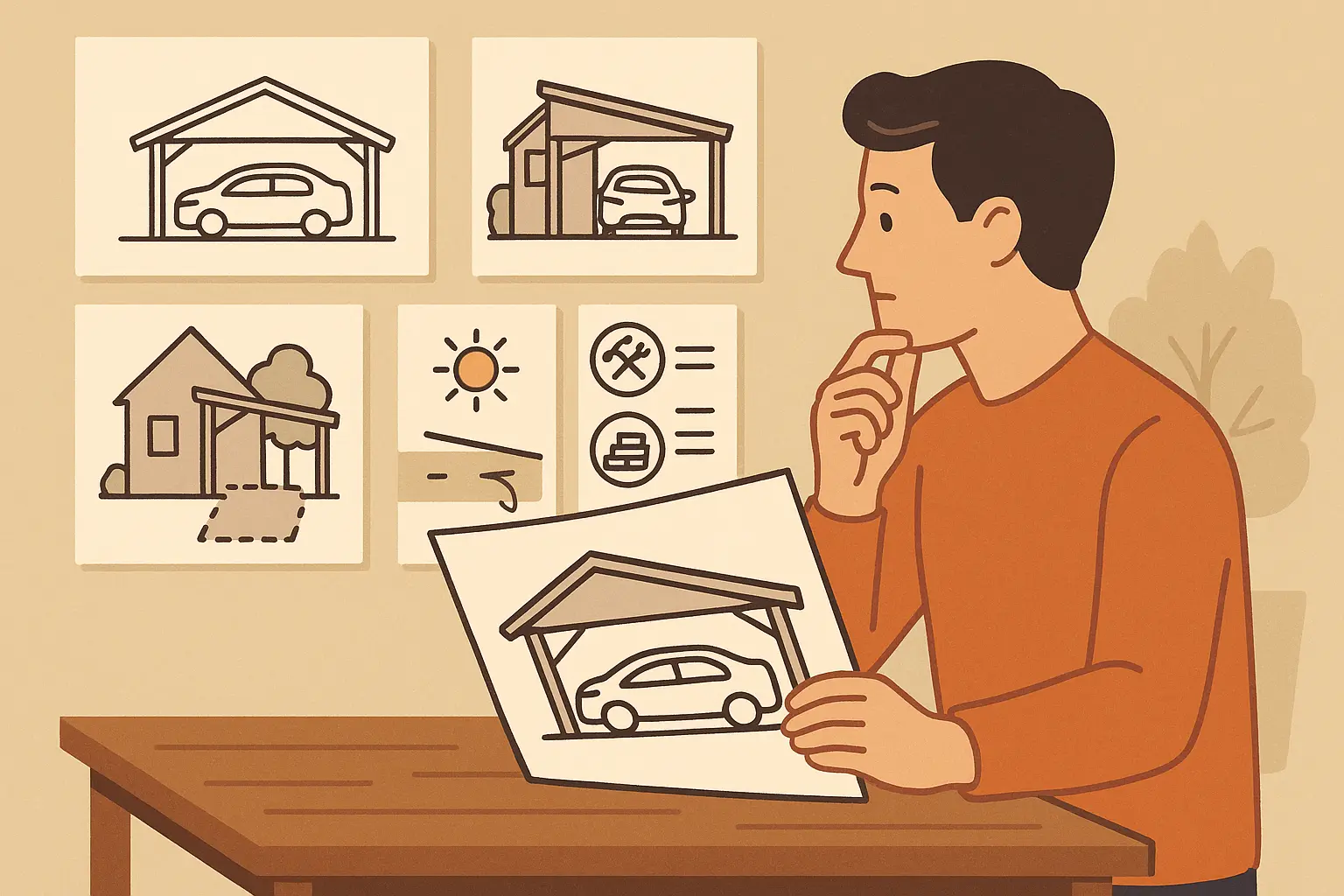25 Practical Carport Ideas to Protect Your Car and Add Value to Your Home
I just discovered that 73% of homeowners who install carports report increased property values within the first year (source). This hit home for me last month when my neighbor’s basic carport addition helped them sell their house $15,000 above asking price. The buyers specifically mentioned how the covered parking sealed the deal – especially since our area gets brutal hail storms every spring.
Here’s the thing – your car represents a serious investment, and leaving it exposed to weather is basically throwing money away on repairs, detailing, and depreciation. Whether you’re dealing with scorching sun, damaging hail, or winter snow, the right carport can solve your protection needs while making your property look better too.
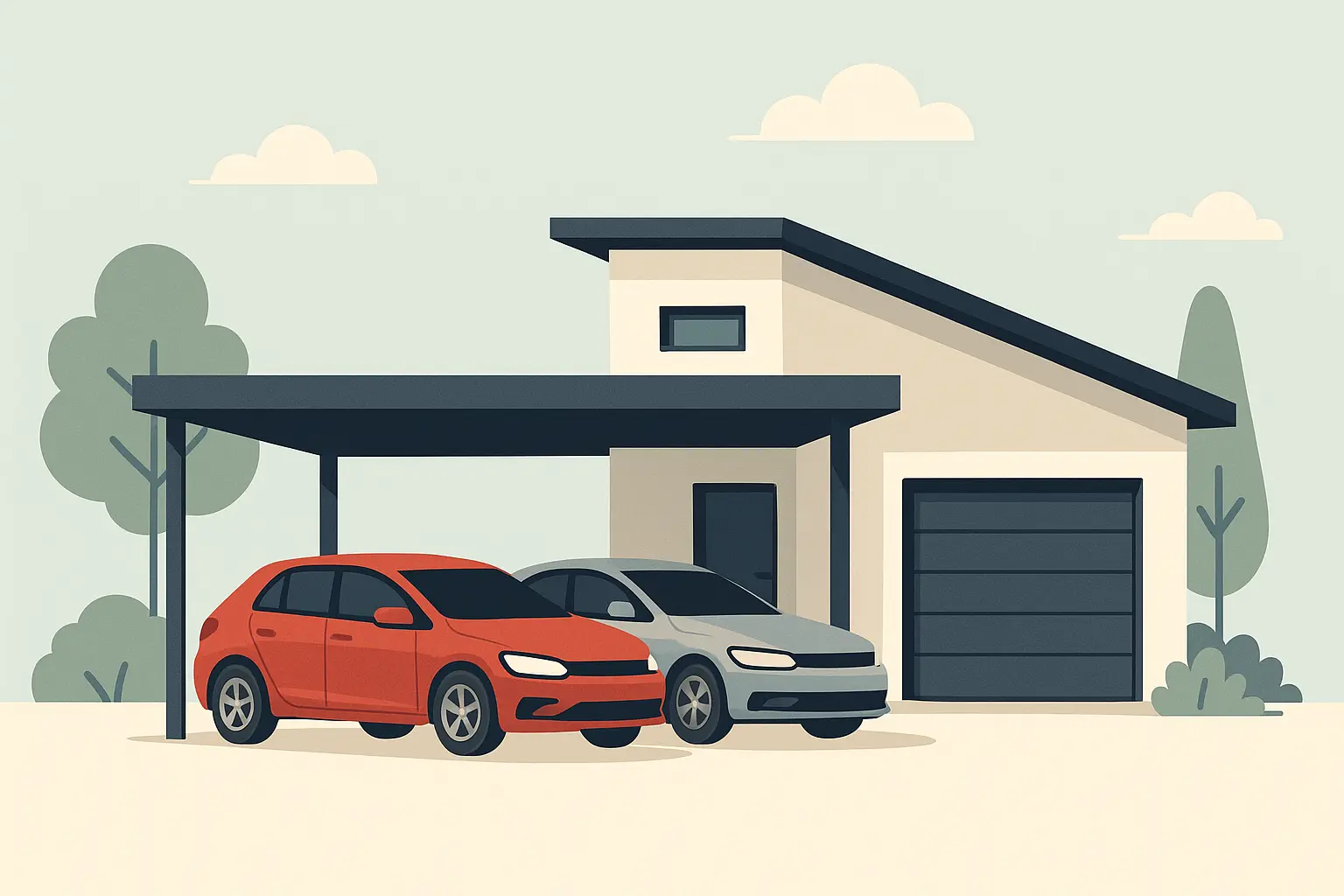
Table of Contents
-
Essential Planning Factors for Your Carport Project
-
Traditional Attached Carport Solutions
-
Standalone Carport Designs for Maximum Flexibility
-
Specialty Carports That Make a Statement
-
Multi-Functional Carports That Work Harder
-
Material-Focused Carport Options
-
Size and Configuration Choices
-
Evaluating Your Best Carport Options
-
Professional Cleanup Services for Your Carport Project
-
Final Thoughts
TL;DR
-
Budget considerations range from $2,000 lean-to designs to $40,000 solar-integrated systems
-
Attached carports offer convenience and lower costs, while detached versions give you more design freedom
-
Your local weather should drive most of your material choices and structural decisions
-
Multi-functional designs get you more bang for your buck by combining vehicle protection with storage or workspace
-
Specialty options like solar panels or living roofs provide extra benefits beyond basic coverage
-
Don’t skip the site prep and cleanup – it’s more work than you think
-
Check your local rules first – they vary a lot depending on where you live
Essential Planning Factors for Your Carport Project
Before you fall in love with any particular design, you need to get real about six things that’ll make or break your project. Let’s talk money first (I know, not fun, but necessary), then we’ll cover your space situation, what Mother Nature throws at you, what you actually need this thing to do, how it’ll look with your house, and what the city says you can and can’t do.
Budget and Investment Analysis
Okay, let’s talk money. I know it’s not the exciting part, but trust me, you don’t want any surprises. Carport costs are all over the map – from $2,000 for a basic lean-to structure to $40,000+ for those fancy solar-integrated systems. But here’s what contractors don’t always tell you upfront: don’t just focus on what you’ll pay today.
Long-term maintenance can bite you in the wallet. Metal structures? Pretty much set-and-forget. Wooden designs? You’ll be staining and fixing things every few years. But here’s the good news – most carports add 50-80% of their construction cost to your home’s value.
When you’re planning your budget, you might need professional garage clean-out services to clear out existing stuff before construction starts. Trust me, it’s more junk than you think.
|
Budget Range |
What You Can Get |
Expected Return |
Yearly Maintenance |
|---|---|---|---|
|
$2,000-$5,000 |
Basic lean-to, simple steel frame |
60-70% |
$50-$150 |
|
$5,000-$12,000 |
Nice gable attached, wood frame |
70-80% |
$100-$300 |
|
$12,000-$25,000 |
Multi-functional, premium materials |
75-85% |
$150-$400 |
|
$25,000+ |
Solar-integrated, living roof |
80-90% |
$200-$500 |
Space and Site Requirements
Your yard space is going to eliminate some options right off the bat, so let’s be realistic. Measure carefully and don’t forget about setback requirements from your property lines – typically 5-10 feet in most areas. And here’s something I learned the hard way: ground conditions matter more than you’d think. Poor drainage can mess up your foundation, and sloped lots might need expensive grading.
Don’t forget about how you’ll actually get in and out. You want easy access without creating a traffic jam in your driveway. And if you’ve got an HOA, check those rules before you fall in love with any particular design.
My friend Sarah from Denver learned this lesson the expensive way. She fell head over heels for this gorgeous wraparound carport design she saw online. After measuring her property, she discovered her 50-foot lot couldn’t fit the 35-foot structure while keeping the required 7.5-foot setbacks on each side. She ended up with a 20×24 gable design that fit perfectly and still protected both family cars.
Climate and Weather Protection Needs
Your local weather should drive most of your decisions here. If you get heavy snow, you need a stronger roof structure. High-wind areas? You’ll need extra anchoring and wind-resistant designs. Live somewhere sunny? UV protection becomes crucial because that sun is slowly destroying your car’s paint and interior.
Ventilation matters too – humid climates benefit from open designs that let air flow through, while cold regions might want more enclosed structures for wind protection.
Traditional Attached Carport Solutions
Attached carports connect right to your house, which saves money through shared structural support and gives you convenient access. These five traditional designs range from budget-friendly lean-to styles to fancy wraparound configurations. Each one offers different benefits in terms of how hard they are to build, how well they protect from weather, and how they look, with costs ranging from $2,000 to $20,000 depending on size and materials.
1. Gable Roof Attached Carport
This is your classic triangular roof design that attaches right to your house wall, creating what looks like a natural extension of your home. Among all the carport options out there, this peaked design is fantastic at shedding water and snow, making it perfect if you get a lot of precipitation.
Construction is pretty straightforward – you attach a ledger board to your house wall and extend rafters to an outer beam supported by posts. You can go with wood framing and metal roofing, or architectural shingles that match your house roof. Expect to spend $3,000-$8,000 depending on size and what materials you choose.
2. Lean-To Style Carport
This is your most budget-friendly attached option – it uses your house wall as the main support and only needs posts along the outside edge. The single-slope design keeps costs down while still protecting your vehicle. Just make sure the roof maintains at least 1/4 inch per foot pitch so water runs off properly.
Simple construction makes this perfect if you’re handy or budget-conscious. The downside? Height limitations due to the sloping design might be tight for taller vehicles. You’re looking at $2,000-$5,000 for most residential setups.
3. Hip Roof Attached Carport
Four sloping roof surfaces that meet at a central ridge create superior wind resistance compared to gable designs. This eliminates those vulnerable gable end walls that can catch wind like a sail, making hip roofs excellent for storm-prone areas.
Construction gets more complex, requiring precise angle cuts and more complicated framing. But the upscale appearance and exceptional durability justify costs ranging $4,000-$10,000. This works particularly well with traditional and colonial home styles.
4. Flat Roof Modern Attached Carport
Contemporary design with minimal slope (minimum 1/8 inch per foot) creates clean, modern lines that work great with contemporary architecture. Modern waterproofing materials like EPDM rubber or TPO membranes provide reliable protection.
Steel or concrete construction creates that sleek appearance modern homeowners want. While it looks flat, proper drainage is still crucial to prevent water from pooling. You’re looking at $4,000-$12,000 depending on materials and structural complexity.
5. Wraparound Attached Carport
This extends along multiple sides of your house, giving you maximum coverage for multiple vehicles plus potential outdoor living space. It’s a complex design that requires careful planning for drainage patterns and multiple structural connections to your home.
The substantial covered area justifies the higher investment of $8,000-$20,000. You’ll get significant outdoor space that can serve multiple functions beyond vehicle protection, making this option particularly valuable for entertaining or additional storage.
Standalone Carport Designs for Maximum Flexibility
Detached carports give you complete design freedom and let you position them anywhere on your property with adequate space. These five standalone options range from traditional gable designs to modern cantilever structures, with costs spanning $3,000 to $30,000. Each provides unique benefits in terms of materials, looks, and capacity for multiple vehicles or future expansion.
6. Traditional Gable Detached Carport
Complete design freedom lets you position this freestanding structure for optimal sun exposure, drainage, and access patterns. Standard construction uses concrete footings, wood or steel framing, and your choice of roofing materials.
The triangular roof provides excellent weather protection while maintaining classic looks that work with most home styles. Costs range $4,000-$12,000 with excellent potential for future expansion or conversion to an enclosed garage.
7. Modern Steel Frame Carport
Galvanized steel framing delivers a 50+ year lifespan with minimal maintenance. Pre-engineered kits make DIY installation possible, while professional assembly ensures optimal results. Clear spans up to 30 feet eliminate interior posts that can make parking a pain.
Various color options and styles accommodate different preferences. The investment of $3,000-$10,000 provides excellent long-term value through durability and low maintenance costs.
My buddy Mike from Phoenix chose a steel frame carport after calculating that the $6,000 initial investment would save him over $15,000 in vehicle maintenance and detailing costs over 10 years. The Arizona sun was causing $800 annually in paint fade and interior damage to his two vehicles. The galvanized steel structure has required zero maintenance in three years, while his cars still look showroom-fresh.
8. Wooden Post and Beam Carport
Heavy timber construction using 8×8 or larger posts creates rustic appeal that works great in natural settings. Traditional joinery techniques like mortise and tenon connections provide exceptional strength and visual interest.
Material options range from economical pressure-treated pine to premium cedar or oak. You’ll need regular maintenance including staining and sealing, but proper care ensures decades of service. Costs range $5,000-$15,000 depending on wood species and construction complexity.
9. Cantilever Carport
This engineered design extends the roof beyond support posts, creating a dramatic floating appearance that serves as an architectural focal point. This requires professional structural design to ensure proper load distribution and safety.
Steel or engineered lumber construction handles the structural demands of long unsupported spans. The unique visual appeal justifies premium costs of $8,000-$20,000, making this option perfect for modern homes seeking distinctive carport designs.
10. Multi-Bay Detached Carport
Large structures accommodating three or more vehicles provide maximum utility for families with multiple cars or those needing equipment storage. You’ll need substantial foundation and structural systems to support the increased loads and spans.
Professional installation becomes essential due to complexity and size. The investment ranges $12,000-$30,000 but creates versatile space that can serve multiple functions including workshops, storage, or future conversion possibilities.
Specialty Carports That Make a Statement
These four innovative carport designs go way beyond basic vehicle protection to provide additional benefits and unique visual interest. Solar-integrated systems generate renewable energy, living roofs offer environmental benefits, curved designs create visual appeal, and butterfly roofs provide modern aesthetics. Costs range from $8,000 to $40,000, but each option delivers distinctive advantages that justify the premium investment.
11. Solar Panel Integrated Carport
This dual-purpose design generates renewable energy while protecting your vehicles from weather damage. Solar panels serve as the actual roofing material, eliminating the need for separate roofing systems. You’ll need additional structural capacity for panels and electrical infrastructure integration.
Federal tax credits and local incentives can significantly offset installation costs. Total investment ranges $15,000-$40,000, but energy savings and potential grid tie-in payments provide ongoing returns. This works particularly well for electric vehicle owners who can charge directly from solar generation.
12. Living Roof Carport
Planted roof systems provide insulation, stormwater management, and habitat benefits while creating unique visual appeal. You’ll need waterproof membranes, drainage systems, growing medium, and appropriate plant selection for your climate.
Structural engineering must accommodate soil weight ranging 80-150 pounds per square foot when saturated. Specialized installation and ongoing maintenance requirements justify costs of $12,000-$25,000, but environmental benefits and energy savings provide long-term value.
13. Curved Roof Carport
This creates distinctive visual appeal using laminated beams, steel arches, or engineered trusses. Complex construction requires professional design and installation to ensure structural integrity and weather protection.
The unique aesthetics make your property stand out while providing excellent weather-shedding characteristics. Premium costs of $10,000-$25,000 reflect the specialized materials and construction expertise required.
14. Butterfly Roof Carport
V-shaped roof design directs water toward central drainage systems while creating modern aesthetic appeal. Two roof surfaces slope inward, requiring careful engineering for proper structural support and waterproofing.
This contemporary design complements modern architecture while providing efficient water management. Engineering requirements and specialized construction justify costs ranging $8,000-$18,000, making this option perfect for homeowners seeking distinctive modern carport designs.
Multi-Functional Carports That Work Harder
These four designs get you more bang for your buck by combining vehicle protection with additional functionality. Storage lofts use vertical space, workshop combinations serve DIY enthusiasts, side storage rooms provide organized storage solutions, and entertainment areas create outdoor living spaces. Costs range from $6,000 to $25,000, but the dual-purpose functionality delivers exceptional value for homeowners wanting more than basic vehicle coverage.
Before building multi-functional carports, many homeowners need storage unit cleaning services to organize existing belongings and figure out what items will move to the new space.
|
Multi-Functional Design |
Main Benefit |
Secondary Function |
Cost Range |
Best For |
|---|---|---|---|---|
|
Storage Loft |
Uses Vertical Space |
Seasonal Storage |
$8,000-$20,000 |
Limited Ground Space |
|
Workshop Combination |
DIY Workspace |
Tool Storage |
$10,000-$25,000 |
Hobbyists/Craftsmen |
|
Side Storage Rooms |
Organized Storage |
Equipment Protection |
$8,000-$18,000 |
Active Families |
|
Entertainment Area |
Outdoor Living |
Event Hosting |
$6,000-$15,000 |
Social Homeowners |
15. Carport with Storage Loft
Two-story design maximizes your property’s vertical space with vehicle parking below and substantial storage above. You’ll need stairs or ladder access, and the floor system must handle storage loads safely. Electrical service enables lighting and outlets for both levels.
This works brilliantly for properties with limited ground space but significant storage needs. Investment ranges $8,000-$20,000, but you’re essentially getting a storage building and carport for less than building them separately.
16. Workshop Carport Combination
Enclosed workshop space alongside open vehicle parking creates the perfect setup for DIY enthusiasts and hobbyists. You can include electrical service, insulation, and climate control in the workshop area while maintaining open vehicle access.
Tool storage, workbenches, and project space transform this from simple vehicle protection into a functional workspace. Costs range $10,000-$25,000 depending on workshop features and size, but the convenience of having protected workspace adjacent to vehicle storage proves invaluable.
17. Carport with Side Storage Rooms
Enclosed storage areas on one or both sides provide secure, weather-protected storage while maintaining open vehicle parking in the center. Various door options and organizational systems customize the storage to your specific needs.
This design excels for storing seasonal items, lawn equipment, tools, and recreational gear. Investment ranges $8,000-$18,000 with excellent storage utility that keeps your main garage or home storage areas less cluttered.
18. Entertainment Area Carport
Extended roof coverage with amenities like ceiling fans, lighting, and electrical outlets creates versatile outdoor living space when not needed for vehicles. Concrete floors, decorative posts, and landscape integration enhance the area’s appeal for gatherings.
You’re essentially creating a covered patio that can accommodate vehicles when needed. Costs range $6,000-$15,000 for this dual-purpose functionality that extends your home’s living space outdoors.
The Johnson family in Austin created the perfect entertainment carport by adding string lights, a ceiling fan, and outdoor furniture to their 24×24 structure. During their daughter’s graduation party, they moved their cars to the street and hosted 40 guests under the covered area. The next day, their vehicles were back in their protected spots, and the space returned to its primary function.
Material-Focused Carport Options
Your material choice dramatically impacts your carport’s durability, maintenance requirements, and looks. These four material-specific approaches offer distinct advantages: all-metal construction provides maximum durability, timber framing delivers natural beauty, concrete and steel create modern industrial aesthetics, and vinyl composites offer low-maintenance solutions. Costs range from $4,000 to $25,000 based on material quality and construction complexity.
19. All-Metal Carport
Steel or aluminum construction throughout provides maximum durability with minimal maintenance requirements. Fire-resistant and insect-proof materials justify the premium investment while offering various color options and architectural styles.
You’ll never worry about rot, termites, or weather damage with properly galvanized metal construction. The investment of $4,000-$15,000 pays dividends through decades of trouble-free service and minimal upkeep costs.
20. Timber Frame Carport
Traditional heavy timber construction using mortise and tenon joinery creates structures that can last centuries with proper maintenance. Wood species options range from economical pressure-treated pine to premium cedar or oak.
The natural beauty and craftsmanship appeal make this option perfect for rustic or traditional properties. You’ll need regular maintenance including periodic staining and sealing, but costs of $6,000-$20,000 deliver timeless appeal and exceptional longevity.
21. Concrete and Steel Modern Carport
Contemporary design combining concrete columns or walls with steel roofing systems creates industrial aesthetics that suit modern architecture perfectly. This combination provides maximum durability with minimal maintenance needs.
The clean lines and robust construction appeal to homeowners seeking low-maintenance, high-durability solutions. Premium materials and specialized construction justify costs of $8,000-$25,000, but you’re investing in a structure that will outlast most alternatives.
22. Vinyl and Composite Carport
Synthetic materials resist weathering, insects, and rot while requiring virtually no maintenance. Various colors and styles can mimic traditional wood appearance without the associated upkeep requirements.
Higher initial costs ($5,000-$12,000) get offset by elimination of ongoing maintenance expenses like staining, sealing, and repairs. This option works well for busy homeowners who want attractive results without ongoing time commitments.
Size and Configuration Choices
Carport sizing depends on your vehicle types, available space, and future needs. Single car compact designs work for urban properties with space constraints, double-wide configurations accommodate most families’ needs efficiently, and oversized options handle RVs or commercial vehicles. Proper sizing ensures adequate clearance while maximizing your investment’s utility and property value impact.
When planning larger carport configurations, consider whether you’ll need construction debris removal services during the building process to maintain a clean and safe work environment.
|
Size Category |
Dimensions |
Vehicle Capacity |
Typical Cost |
Best Applications |
|---|---|---|---|---|
|
Single Compact |
12×20 feet |
1 standard car |
$2,000-$6,000 |
Urban lots, condos |
|
Standard Single |
14×24 feet |
1 large vehicle |
$3,000-$8,000 |
Suburban homes |
|
Double-Wide |
20×20+ feet |
2 standard cars |
$4,000-$12,000 |
Family homes |
|
Oversized/RV |
14×40+ feet |
RV/boat/commercial |
$8,000-$30,000 |
Recreational vehicles |
23. Single Car Compact Carport
Minimalist design for properties with limited space, typically 12×20 feet, accommodates most standard vehicles in urban settings or as additions to existing garage space. Simple construction keeps costs manageable while providing essential vehicle protection.
Perfect for condos, townhomes, or properties where space comes at a premium. The investment of $2,000-$6,000 provides essential vehicle protection without overwhelming smaller properties or budgets.
24. Double-Wide Carport
Most popular residential size at 20×20 feet or larger accommodates two vehicles side by side efficiently. This configuration offers excellent value for families with multiple cars while maintaining reasonable construction costs.
This is the sweet spot for most homeowners – it balances capacity, cost, and property impact effectively. Costs range $4,000-$12,000 depending on design complexity and materials, making this size accessible for most budgets while providing substantial utility.
25. RV and Oversized Vehicle Carport
Extra dimensions accommodate recreational vehicles, boats, or commercial equipment with minimum 14-foot height clearance and spans up to 40+ feet. You’ll need specialized engineering to ensure structural integrity for larger spans and increased loads.
This investment ranges $8,000-$30,000 but becomes essential for protecting valuable recreational vehicles or equipment. The specialized nature requires professional design and installation, but proper protection for expensive RVs or boats justifies the investment.
Evaluating Your Best Carport Options
Matching carport designs to your specific needs requires evaluating each option against your budget, space, climate, functionality, aesthetic, and legal requirements. If you’re budget-conscious, focus on lean-to and basic steel designs. If you want premium features, consider solar integration or specialty materials. Your local weather should heavily influence material and structural choices, while what you actually need determines size and feature requirements.
Start with budget reality – figure out what you can actually afford including permits and site preparation. Space constraints will eliminate some options immediately, while climate factors should heavily influence material and structural choices.
Functionality needs vary dramatically between households. Do you need basic vehicle protection, or would storage, workspace, or entertainment features justify higher costs? How well it looks with your existing home and neighborhood standards affects both satisfaction and property values.
Legal compliance varies significantly by location and design complexity. Simple attached structures typically require basic permits, while complex designs like solar integration or living roofs need specialized approvals and professional engineering.
Professional Cleanup Services for Your Carport Project
Here’s something I didn’t expect when I started my carport project – the amount of junk I had to clear out first. Successful carport installation requires proper site preparation, construction debris management, and post-installation organization. JiffyJunk’s professional services handle pre-construction decluttering, ongoing debris removal during construction, and post-completion cleanup to optimize your new space. Their eco-friendly practices and transparent pricing ($150-$600+ based on truck space) often prove more economical than DIY disposal methods.
Site preparation often gets overlooked in carport planning, but it’s crucial for project success. Many properties need significant decluttering and junk removal from proposed carport areas before construction can begin. Trust me, it’s more accumulated stuff than you think – items from garages, yards, and storage areas that must be cleared to create clean workspace.
During construction, debris from demolition, packaging materials, and construction waste accumulates quickly. Professional hauling services keep your property clean and safe throughout the process, removing materials that could pose safety hazards or delay completion.
Once your carport’s complete, you’ll likely need to reorganize existing storage and dispose of items that no longer fit your new setup. Professional scrap metal pick-up helps optimize your newly protected space while ensuring unwanted items get donated or recycled rather than simply dumped in landfills.
JiffyJunk’s nationwide coverage across 44 locations in 13 states provides professional support whether you’re in dense urban areas or rural locations. Their 24/7 customer service and instant online estimates make coordinating cleanup services with your construction timeline straightforward and stress-free.
Final Thoughts
Look, at the end of the day, choosing the right carport comes down to balancing multiple factors – your budget, space, climate, and what you actually need it to do. The 25 options we’ve covered offer solutions for virtually every situation, from basic $2,000 lean-to structures to premium $40,000 solar-integrated systems.
Here’s my advice: don’t just focus on upfront costs. Think about maintenance requirements, durability, and how well each option serves your specific needs. Your local weather should drive most of your material and structural choices, and proper site preparation ensures successful installation.
Whether you choose a simple attached design or a complex multi-functional structure, proper planning and professional installation will give you years of reliable service. Your car deserves protection from weather damage, and your property deserves the added value and functionality that the right carport design provides.
My advice? Start simple. You can always add fancy features later. Whatever you choose, just make sure it fits your life, not someone else’s Instagram feed.
